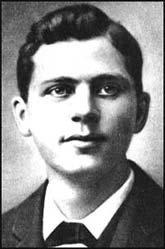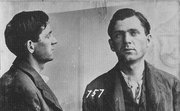Leon Czolgosz
|
|
Leon Frank Czolgosz (1873–October 29, 1901) was the assassin of U.S. President William McKinley and a registered Republican though many contend that he was heavily influenced by anarchist writers such as Emma Goldman. His actual date of birth is unknown - some sources state, without offering any evidence, that he was born on 1st January 1873.
One of seven children of Russian-Polish immigrants, Czolgosz (pronounced cholgaush) was born in Detroit, Michigan, and lived in conditions of brutal poverty most of his life. He left his family farm in Cleveland, Ohio at age ten to work at American Steel and Wire Company with two of his brothers. When Czolgosz was 12, his mother died while giving birth to another child. At the height of his employment, he was making $4 a day, but after the workers of his factory went on strike (during a time when unions were considered dangerous and illegal), they were fired.
In 1898, after witnessing a series of similar strikes (many ending in police confrontation), Czolgosz returned home, where he was constantly at odds with his family's Roman Catholic beliefs and with his stepmother. He became a recluse, and spent much of his time alone, reading socialist and anarchist newspapers. Some speculate that Czolgosz may have suffered a mental breakdown. He was very affected by hearing a speech of Emma Goldman, who later wrote a piece sympathetic to Czolgosz's assassination of McKinley, though not quite supportive. However, Czolgosz, as far as is known, failed to ingratiate himself with any group. Indeed, his fanaticism aroused their suspicions; some even thought he may have been a covert government agent.
The radical Free Society newspaper issued a warning pertaining to Czolgosz reading:
- "The attention of the comrades is called to another spy. He is well dressed, of medium height, rather narrow shouldered, blond, and about 25 years of age. Up to the present he has made his appearance in Chicago and Cleveland. In the former place he remained a short time, while in Cleveland he disappeared when the comrades had confirmed themselves of his identity and were on the point interested in the cause, asking for names, or soliciting aid for acts of contemplated violence. If this individual makes his appearance elsewhere, the comrades are warned in advance and can act accordingly."
Czolgosz's experiences had convinced him there was a great injustice in American society, an inequity which allowed the wealthy to enrich themselves by exploiting the poor. He concluded the reason for this was the structure of government itself. Then on July 29, 1900, King Umberto I was assassinated by avowed anarchist Gaetano Bresci. Bresci told the press he had to take matters into his own hands for the sake of the common man. The assassination sent shockwaves through the American anarchist movement. In Bresci, Czolgosz found his hero: a man who had the courage to sacrifice himself for the cause. When he was later arrested, police found a folded newspaper clipping about Bresci in Czolgosz’s pocket.
On August 31, 1901 he moved to Buffalo, New York and rented a room near the site of the Pan-American Exposition. On September 6, Czolgosz went to the exposition with a pistol in his hand, concealed in a handkerchief. McKinley had been standing in a receiving line greeting the public for several minutes when Czolgosz shot McKinley twice at point-blank range. McKinley would die from his wounds on September 14.
After a short trial, Czolgosz was found guilty and executed by electrocution, by three jolts at 1700 volts each, on October 29, 1901, in Auburn prison in Auburn, New York. His last words were "I killed the President because he was the enemy of the good people—the good working people. I am not sorry for my crime."
The gun used by Czolgosz was an Iver-Johnson "Safety Automatic" revolver in .32 Smith & Wesson caliber, serial number 463344. Czolgosz purchased the gun on September 2, 1901.
His story, along with those of 8 other presidential assassins and would-be assassins, was the basis of Stephen Sondheim-John Weidman Broadway musical Assassins. In the musical, he is befriended by fellow assassins Charles Guiteau and the ghost of John Wilkes Booth, also the only other two characters with "ballads". His song, The Ballad of Czolgosz, is an upbeat, folk song that contrasts sharply with Booth's earlier ballad.



